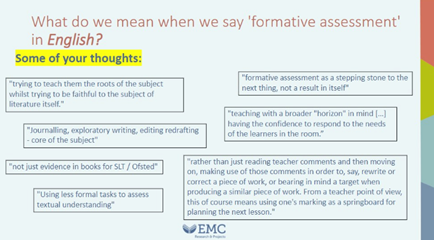Since our first survey, the decline has been widely reported. Figures published by the Joint Council for Qualifications (2019) show a 31% decline across all three English subject specialisms between 2012 and 2019, with a 13.5% decline between 2018 and 2019. The decline in A Level English Language and Literature is most alarming, with a 56% reduction since 2011. The picture is almost as bad for A Level English Language, where the figure is 42%. For A Level English Literature the number is 25%.[1]
Reasons for the accelerating decline are several and complex. In our last survey, teachers identified the role played by the promotion of STEM subjects, for example, and the reduction in numbers of subjects taken as a result of A Level reform and the withering of the AS qualification. The decline, though, has not been nearly so marked in other Humanities subjects. It is also worth noting that there has seems to have been no comparable decline in Scotland, where students sit a different set of examinations and English remains a vibrant, popular subject.
We wanted this survey to probe more deeply into what lies behind the numbers. What impact is this decline having on schools and colleges on the ground? Why do teachers think it is happening?
Two major themes emerged from the survey:
- That the decline is even starker than the raw figures suggest, affecting English Language and Language and Literature particularly badly but also damaging A Level Literature;
- That GCSE English Language plays a major role in turning large numbers of this generation of students off English.
(For English Literature A Level, teachers continue to feel that a move away from reading for pleasure is a factor but they did not choose to comment on this at length, perhaps because this has been a long-term concern. A further survey into reading for pleasure and the KS3 curriculum would be very valuable).
Theme 1: Looking behind the raw figures
i. The decline in numbers is system-wide
The following percentages of respondents reported a decline in numbers in line with the national picture or worse:
- 79% of respondents for A Level Literature
- 82% of respondents for A Level Language
- 99% of respondents for A Level Language and Literature
(Note that the national picture figures given to EMC survey respondents were for the exam entries in 2019. These are the students who took up the subject in 2017. The Oct 2019 survey question was about the current recruitment picture, two years on. These suggest a continuing or worsening decline in line with that of 2017. The 2021 official statistics for entries should confirm this view.)
The numbers reporting an increase in recruitment were very small:
- 4% of schools teaching A Level Literature
- 6% of schools teaching A Level Language
- 0% of schools teaching A Level Language and Literature
ii. Courses are closing in large numbers
Of the schools that responded:
- 1% once offered AL Literature but no longer do so (2 schools)
- 15% once offered AL Language but no longer do so (19 schools)
- 47% once offered AL Language and Literature but no longer do so (34 schools)
Scaled up, this points to a national picture in which hundreds of schools and colleges no longer offer A Levels in English Language or combined English Language and Literature. With fewer courses on offer, figures are almost certain to decline further in the next few years.
iii. Classes are being cut in large numbers
Where schools still offer English A Levels, they often have far fewer classes than they did recently.
‘We used to fill two classes per year group for A Level English Literature and now have just one class for Year 12 and one for Year 13.’
‘We used to offer two sets for Literature at A Level, with cohorts between 20 and 25 entries. Now, we’ve had our sets reduced to one, with class sizes between 6 and 9.’
iv. Class sizes are close to unsustainable in several schools and colleges
‘Our class size has reduced from 15-20 to 4-8 students.’
‘We used to have approximately 20/22 students wanting to study English Lit - numbers have consistently fallen over the past years to around 10 to 2 this year.’
‘Literature numbers have collapsed to single figures.’
‘Language has gone from around 20 pupils to 3-4.’
‘We used to have all three subjects flourishing, now we only have a Lang/Lit course of 10 students.’
‘I love teaching A Level but it is becoming very difficult with smaller classes as discussions become stilted and too teacher-led.’
Theme 2: The role played by GCSEs, particularly English Language
i. GCSE English the major cause of decline
Teachers were offered a list of nine reasons as to why recruitment might be in decline.
‘Students not enjoying GCSE English’ was the top ranked reason when looking at all three English A Levels in combination.
‘Students not enjoying GCSE English’ was also the top ranked reason identified for a decline in A Level English Language and combined A Level English Language and Literature recruitment.
‘Students not enjoying GCSE English’ was the third ranked reason identified by teachers as the reason for a decline in A Level Literature recruitment.
‘STEM being seen as the best option in HE and for employment’ was the top ranked reason identified for a decline in A Level Literature recruitment.
These comments were typical of what was said about the experience of doing English GCSE subjects:
‘Students hate the GCSE and seem to be being taught ‘English by numbers’. It is definitely putting them off.’
‘The new GCSE specifications have really killed the joy of English.’
‘GCSE syllabuses just aren’t sufficiently stimulating and engaging - students are switched off.’
ii. GCSE English Language is a bigger factor than Literature
Comments were particularly critical of the role played by GCSE English Language in putting students off the subject. It was described as ‘dull’, ‘dry’, ‘joyless’, ‘narrow’, ‘off-putting, ‘relentless’, ‘limiting’, ‘outdated, and ‘awful’, with only a tiny minority having anything positive to say about it.
‘GCSE English Language is dry, dull and difficult and disaffects students of all ability levels.’
‘Students often find English language GCSE very dull and I think this puts them off further study.’
iii. GCSE English Literature offers a mixed picture
There was less unanimity about GCSE English Literature having a negative effect on A Level recruitment. However, a very large number of teachers did raise concerns. The view of those teachers in their detailed comments was that the narrow choice of texts, lack of diversity, the absence of coursework, the emphasis on closed books and on memorisation were a contributing factor to students’ decisions not to take the subject further.
‘Texts for GCSE literature are often not seen as relevant, so enjoyment has dropped.’
‘... the texts chosen for study are largely white, male and old. This makes English Literature seem outdated and dry- this does not help recruitment.’
iv. Inadequate links between GCSE and A Level, especially for Language
Teachers felt the lack of continuity between GCSEs and A Levels in terms of disciplinary content and approaches was off-putting for students. This was particularly the case with Language A Level, where there is nothing in the GCSE to give any sense of what the A Level might be like – no language study, or investigative work to whet students’ appetite for further study.
‘The Language paper does not prepare them very well. Where is the spoken language element? It is a very dry exam.’
‘For Language, the GCSE is so redundant in relation to A Level that they barely see a connection between them.’
v. Social justice implications
Several private schools reported teaching the IGCSE, a qualification not available to state school students. These schools reported smaller declines in recruitment, raising serious concerns about the social justice implications of the current GCSEs: it suggests state school students are being given a different, perhaps more impoverished, diet that is more likely to put them off further study.
'We do iGCSE Edexcel, which leads very effectively to A Level.'
'We are fortunate in being able to offer IGCSE English Language and Literature (CIE). Although there are issues with these specs, I feel they are better and more engaging than the new 2015 GCSEs.'
'We do IGCSE which is much better preparation and feed into A Level'
'We follow IGCSE, which is a good lead-in to A Level.'
How the survey was carried out
- The survey was carried out by the English and Media Centre in October 2019 on behalf of the Common English Forum. This is an umbrella group of organisations representing English subject specialisms at all levels from primary to university.
- The survey was open to all English teachers, who were alerted to it via our email list and social media accounts. 207 schools took part. All of these provided data about A Level English Literature, 124 about A Level Language and 72 about combined A Level Language and Literature.
Notes
[1] Sources of statistics in full report – Joint Council for Qualifications (2012 and 2016-19) and GCE Inter-Board Statistics for breakdown of figures for different subjects in 2011.
The full report, including appendices is available to download here.




